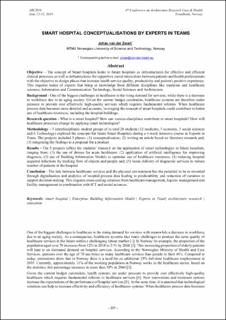| dc.contributor.author | van der Zwart, Johan | |
| dc.date.accessioned | 2022-01-31T19:21:53Z | |
| dc.date.available | 2022-01-31T19:21:53Z | |
| dc.date.issued | 2021 | |
| dc.identifier.isbn | 978-82-536-1718-3 | |
| dc.identifier.issn | 2387-4295 | |
| dc.identifier.uri | https://hdl.handle.net/11250/2976135 | |
| dc.description.abstract | Objective – The concept of Smart hospitals looks to future hospitals as infrastructures for effective and efficient clinical processes as well as infrastructures for supportive social interactions between patients and health professionals with the objective to design places that increase health service quality, productivity and patient's positive experience. This requires teams of experts that bring in knowledge from different disciplines like medicine and healthcare sciences, Information and Communication Technology, Social Sciences and Architecture.
Background - One of the biggest challenges in healthcare is the rising demand for services, while there is a decrease in workforce due to an aging society. Given the current budget constraints, healthcare systems are therefore under pressure to provide cost effectively high-quality services which requires fundamental reforms. When healthcare process data becomes more detailed and accurate, leveraging the concept of smart hospitals could contribute to better use of healthcare resources, including the hospital buildings.
Research question - What is a smart hospital? How can various disciplines contribute to smart hospitals? How will healthcare processes change by applying smart technologies?
Methodology – 5 interdisciplinary student groups of in total 28 students (12 medicine, 5 economy, 5 social sciences and 6 Technology) explored the concepts for future Smart Hospitals during a 4-week intensive course in Experts in Team. The projects included 3 phases: (1) conceptualisation; (2) writing an article based on literature research and; (3) integrating the findings in a proposal for a product.
Results - The 5 projects reflect the students’ research on the application of smart technologies in future hospitals, ranging from: (1) the use of drones for acute healthcare: (2) application of artificial intelligence for improving diagnosis; (3) use of Building Information Models to optimise use of healthcare resources; (4) reducing hospital acquired infections by tracking flow of objects and people and; (5) home delivery of diagnostic services to reduce number of patients in the hospital.
Conclusion - The link between healthcare services and the physical environment has the potential to be re-invented through digitalisation and analytics of hospital process data leading to predictability and reduction of variation to support decision making. This requires cross-cutting solutions from healthcare management, logistic management and facility management in combination with ICT and social sciences. | |
| dc.language.iso | eng | |
| dc.publisher | SINTEF Academic Press | |
| dc.relation.ispartof | ARCH19 June 12–13, 2019 – Trondheim, Norway. Proceedings from the 4th Conference on Architecture Research Care & Health | |
| dc.relation.ispartofseries | SINTEF Proceedings;8 | |
| dc.rights | CC BY 4.0 | |
| dc.rights.uri | https://creativecommons.org/licenses/by/4.0/ | |
| dc.subject | Smart hospital | |
| dc.subject | Enterprise Building Information Model | |
| dc.subject | Experts in Team | |
| dc.subject | Architecture research | |
| dc.subject | Education | |
| dc.title | Smart hospital conceptualisations by experts in teams | |
| dc.type | Chapter | |
| dc.type | Peer reviewed | |
| dc.type | Conference object | |
| dc.description.version | publishedVersion | |
| dc.rights.holder | © 2021 The Authors. Published by SINTEF Academic Press. | |

